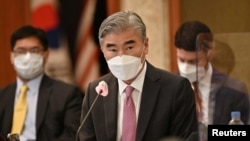The U.S. special representative for North Korea on Monday offered to meet with Pyongyang “anywhere, anytime, without preconditions,” with no public contact so far between the Biden administration and the nuclear-armed nation.
Sung Kim’s remarks came after North Korean leader Kim Jong Un last week gave his first reaction to Washington’s recent review of its approach to his isolated country, saying Pyongyang must prepare for both “dialogue and confrontation.”
The Biden administration has previously promised a “practical, calibrated approach,” including diplomatic efforts, to persuade the impoverished North to give up its banned nuclear weapons and ballistic missile programs.
“We continue to hope that the DPRK will respond positively to our outreach, and our offer to meet anywhere anytime without preconditions,” US envoy Kim said during a five-day visit to Washington’s ally South Korea, referring to the North by its official name.
Last week, Kim Jong Un said the country’s food situation was “tense,” sounding the alarm in a country with a moribund agricultural sector that has long struggled to feed itself and is now under self-imposed isolation to try to protect itself against the coronavirus pandemic.
Pyongyang’s state-run KCTV on Sunday reported leader Kim and top officials had discussed “emergency measures” to tackle the country's “current food crisis.”
North Korea has long insisted that it has had no cases of the virus — a claim that analysts doubt — but it has paid a heavy economic price for its self-imposed blockade.
Trade with China, its economic lifeline, has slowed to a trickle, while all international aid work faces tight restrictions.
Envoy Kim on Monday urged U.N. security council members — a group which includes China — to fully implement resolutions against Pyongyang, which limit North Korean imports of oil and its exports of coal, textiles and fish, among other things.
“We will continue to implement all U.N. Security Council resolutions addressing the DPRK,” he said, using the North’s official name.
“We also urge U.N. member states, especially U.N. Security Council members, to do the same to address the threat posed to the international community by the DPRK.”




